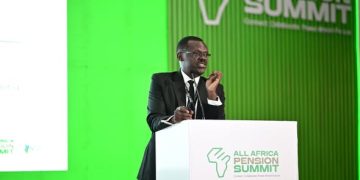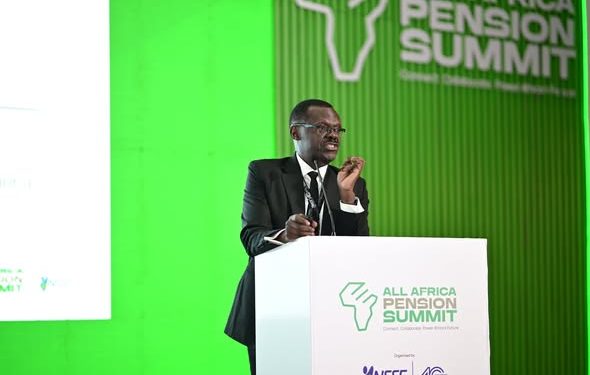Munyonyo — National Social Security Fund (NSSF) Managing Director Patrick Ayota has called for urgent action to mobilise Africa’s pension assets as a key source of financing for the continent’s infrastructure and development agenda, saying the time has come for Africa to “fund its own future.”
Ayota made the remarks while delivering the opening address at the All Africa Pension Summit 2025, hosted by NSSF Uganda at Speke Resort, Munyonyo in Kampala, under the theme “Connect. Collaborate. Power Africa’s Future.” The three-day summit has brought together policymakers, investors, and thought leaders from across the continent to discuss how to unlock long-term capital and expand pension coverage.
“We stand at a critical juncture,” Ayota said. “Traditional development finance is declining, yet our infrastructure needs are soaring. The question isn’t whether we can fund our own growth — it’s how quickly we can mobilise the capital that’s already within our reach.”
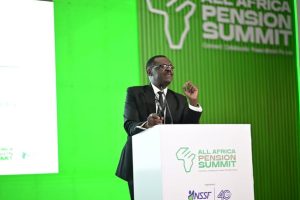
Citing statistics from the African Development Bank, Ayota noted that Africa faces an annual financing gap of about USD 1.3 trillion, which many countries attempt to bridge through borrowing.
“To close this gap, we’ve relied too heavily on debt — both domestic and external,” he said. “But this growing debt burden is crowding out resources needed for social services, infrastructure, and economic development.”
Ayota pointed out that despite Africa having one of the lowest default rates in the world — around 1.4 percent — the continent continues to face disproportionately high borrowing costs.
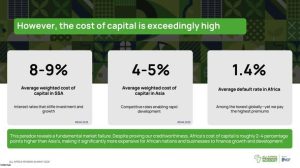
“Across Sub-Saharan Africa, the cost of capital averages between 8 and 9 percent,” he said. “Compare that to Asia, where rates range from 4 to 5 percent. That gap represents a structural imbalance. Our economies are creditworthy, but we continue to pay a premium just to access financing.”
He urged African leaders and financial institutions to work together to address this imbalance and create a fairer, more enabling financial landscape.
“It’s time we corrected this structural challenge,” Ayota said. “We must build a financing ecosystem that reflects our growing creditworthiness and unlocks our potential for inclusive growth.”
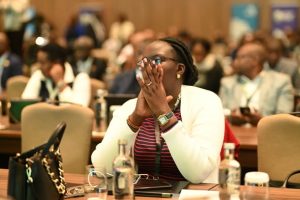
Ayota emphasised that pension funds offer a powerful solution to Africa’s financing dilemma, describing them as “patient capital” ideally suited for long-term investment.
“Pensions hold patient capital — the perfect engine for Africa’s development,” he said. “With long-term investment horizons, steady cash flows, and built-in inflation protection, pension funds are uniquely positioned to drive sustainable growth. They don’t just deliver financial returns; they create jobs, strengthen communities, and power the continent’s future.”
His remarks set the tone for a summit focused on unlocking domestic capital, building partnerships, and promoting sustainable investments that respond to Africa’s social and economic realities.
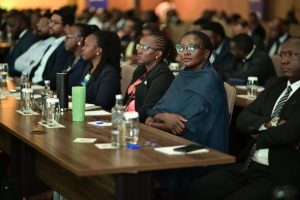
Other speakers echoed Ayota’s call for greater African ownership of the continent’s development financing. David Owino, Chair of the East Africa Venture Capital Association (EAVCA), noted that most private equity funds operating in Africa are still funded from outside the continent.
“Today, African investors contribute only about one percent of the private equity capital deployed here,” Owino said. “That means there are people who believe in Africa’s development more than Africans believe in themselves. We must change that mindset.”
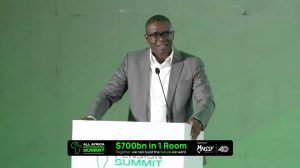
Peter Moyo, Advisory Board Member at Desmos Capital, urged pension institutions to innovate beyond traditional models that exclude the majority of Africa’s workers. “Over 80% of Africa’s workforce is in informal employment,” Moyo said. “We must design pension systems flexible enough to include this majority. The question is — are we sitting on a time bomb or a huge opportunity? I believe it’s an opportunity.”
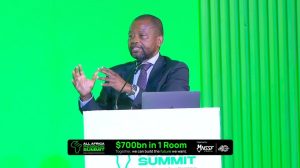
Siongo Kisoso, Head of Regional Office East Africa, Swedfund, on the question of how investing in local currencies as an International DFI has turned out. “We recently invested in Zambia in a local currency debt platform, and we did this alongside the local public pension fund – NABSA and another European DFI, so far it’s working well,” he said.
“As a DFI, one of our objectives is to be catalytic, and this is why DFIs are increasingly looking at investing in local currencies. For every dollar we invest, we must mobilise at least 30%. There is a big need for SME financing in Zambia, which is not unique, and that is where we come in from a technical advisory point,” he added.
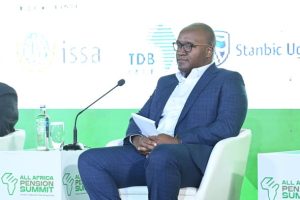
The event was also attended by Hon. Betty Amongi, Uganda’s Minister of Gender, Labour, and Social Development, who underscored Uganda’s commitment to linking pension reform, labour equity, and social protection.
Over the next three days, the All Africa Pension Summit 2025 will focus on unlocking long-term capital, expanding coverage, and advancing sustainability across Africa’s pension landscape — to position local institutions like NSSF Uganda at the heart of the continent’s growth story.
“Africa’s future will be funded by Africans,” Ayota concluded. “Our mission is clear — connect, collaborate, and power that future together.”

